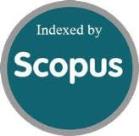Hybrid OFDM/OOK Modulations in OCDMA Scheme for Free Space Optics
Keywords:
optical code-division multiple-access (OCDMA), free space optics (FSO), orthogonal frequency division multiplexing (OFDM), multiple access interference (MAI)Abstract
The study proposes hybrid analog/digital transmission format scheme which integrated optical code-division multiple-access (OCDMA) and polarization multiplexing technique in free space optics (FSO) transmission. Orthogonal frequency division multiplexing (OFDM) transmits as the analog format and (on-off keying) OOK transmits as digital format in the study, respectively. In the proposed hybrid OCDMA system, it has high-speed transmission, signal security and low cost…etc. The multiple access interference (MAI) can be efficiently eliminated by using the balanced detection scheme at the receive end.
References
P. Tjondronegoro, “Free-space optics for fixed wireless broadband,” pp. 2-20, Oct. 2004.
Z. Wei, H. M. H. Shalaby, and H. Ghafouri-Shiraz, “Modified quadratic congruence codes for fiber bragg-grating-based spectral-amplitude- coding optical CDMA systems,” J. Lightwave Technol., vol. 19, pp. 1274-1281, Sep. 2001.
M. Selvi and K. Murugesan, “Performance of OFDM based FSO communication systems using M-ary PSK modulation,” International Journal of Computer Applications, vol. 49, pp. 41-45, July 2012.
J. F. Huang and C. T. Yen, “Phase noise suppression in multilevel optical code-division multiple-access network coding system with embedded orthogonal polarizations,” Optical Engineering, vol. 45, pp. 065005, June 2006.
V. Sharma and G. Kaur, “Modelling of OFDM-ODSB-FSO transmission system under different weather conditions,” Advanced Computing and Communication Technologies (ACCT), pp. 154-157, April 2013.
Downloads
Published
How to Cite
Issue
Section
License
Submission of a manuscript implies: that the work described has not been published before that it is not under consideration for publication elsewhere; that if and when the manuscript is accepted for publication. Authors can retain copyright of their article with no restrictions. Also, author can post the final, peer-reviewed manuscript version (postprint) to any repository or website.

Since Oct. 01, 2015, PETI will publish new articles with Creative Commons Attribution Non-Commercial License, under The Creative Commons Attribution Non-Commercial 4.0 International (CC BY-NC 4.0) License.
The Creative Commons Attribution Non-Commercial (CC-BY-NC) License permits use, distribution and reproduction in any medium, provided the original work is properly cited and is not used for commercial purposes



